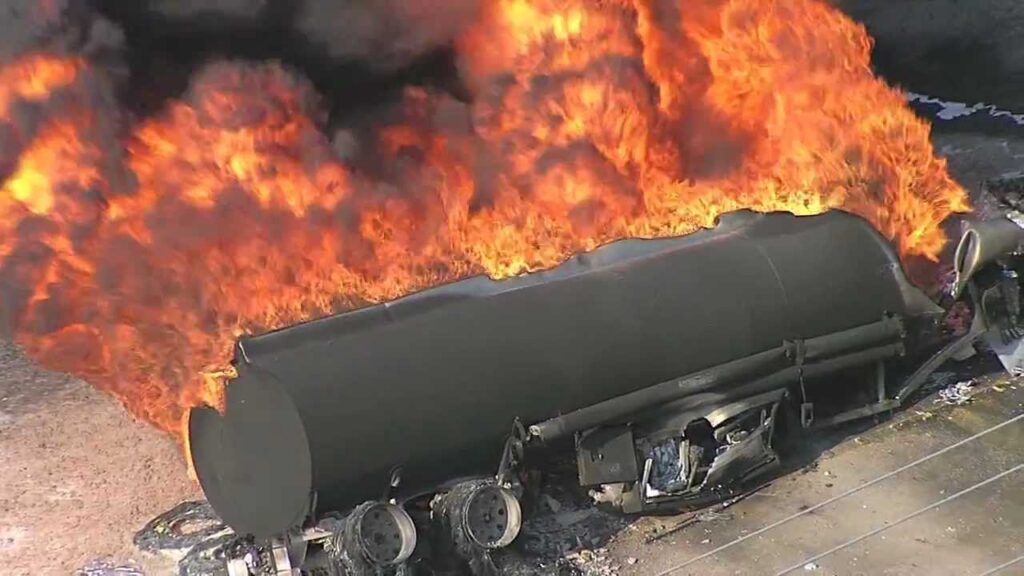Olayomi Koiki

At least 18 people were burnt to death and 13 others injured after a fuel-laden tanker exploded in southeastern Nigeria, authorities said, in a third incident recorded within a week.
The latest incident happened om Saturday at Ugwu Onyeama, along the Enugu-Onitsha Expressway, in the Udi Local Government Area of Enugu State.
The fuel-laden tanker – while descending a hill – reportedly collided with a water truck belonging to JUHEL Nigeria Limited, triggering an explosion at about 11:30 am, local news outlets reported.
The Federal Road Safety Corps (FRSC) said in a Saturday statement that the crash involved 17 vehicles, including a petrol tanker, a water tanker, 15 cars, and a tricycle.
Vehicles involved in the tanker fire include a Toyota Camry, two Sienna buses, a tricycle, a Lexus SUV, a commuter bus, a minibus, an L300 bus, a low-bed truck carrying an excavator, and a Mack trailer truck.
Citing preliminary reports, FRSC spokesman Olusegun Ogungbemide said the petrol tanker, laden with premium motor spirit, lost control after its brakes failed, resulting in a collision that triggered a fire incident.
“A total of 31 people were involved in the crash. Ten were rescued with varying degrees of injury, while three escaped unscathed. Unfortunately, the remaining 18 victims were burnt beyond recognition,” Ogungbemide said.
“The tanker experienced brake failure, and the driver lost control, leading to a collision with 17 vehicles.”
The Corps Marshal, Shehu Mohammed, expressed his condolences to the families of the victims and wished the injured speedy recovery.
He also urged motorists to exercise caution, particularly when navigating alternative routes.
Eyewitnesses said the tanker spilled its contents along the road, covering a stretch of over 17 electric poles, with the ensuing fire spreading rapidly, and consuming everything in its path.
Sympathisers at the scene said the intensity of the fire hindered rescue efforts, making it difficult to save those trapped in the vehicles.
The rescue operation involved policemen, men of the state fire service, Federal Road Safety Corps, and other security agencies. Traffic was diverted to ease movement while efforts to evacuate the wreckage were underway.
A trending video recorded at the incident scene and seen by KOIKI Media – shows charred remains of the victims.
An eyewitness, who identified himself only as Anthony, described the explosion as devastating and called on the Federal Government to prioritise railway systems and pipelines for transporting petrol and other flammable products.
“Enough is enough. This tanker delivery system is a disaster waiting to happen every day. It’s not working for us anymore,” The Punch newspaper quoted Anthony as saying.
The National Emergency Management Agency (NEMA) said it had deployed a response team to the Enugu-Onitsha Expressway to assess the situation.
The Head of Media and Public Relations of NEMA, Manzo Ezekiel, said in a Sunday statement: “This tragic tanker fire explosion underscores the importance of our sensitisation campaigns on the safe transportation of petroleum products.
“Our officers from the Enugu office have been dispatched to the scene to assess the immediate needs and provide support.”
Ezekiel emphasised the risks associated with transporting fuel using tankers and urged stakeholders to adopt stringent safety measures.
“This incident, reportedly caused by a tyre explosion, highlights the dangers of handling flammable substances carelessly. While this case wasn’t linked to fuel scooping, we must continue educating operators and the public on these risks,” he added.
The explosion occurred a week after a similar incident occurred in the central city of Suleja in Niger State, which killed at least 86 people. At least one person was killed last Wednesday in another fuel-laden tanker explosion in the southwestern city of Ibadan, the Oyo State capital.
In the Niger State incident, the tanker carrying 60,000 litres of petrol overturned at Dikko Junction, spilling its contents as residents gathered to scoop fuel. The fire that resulted killed at least 86 residents and injured several others. The price of gasoline has increased fivefold in 18 months, leading many to risk their lives to recover fuel during tanker truck accidents which authorities say are common in Nigeria.
In the Ibadan incident, the tanker truck lost control, rammed into two other trucks, and somersaulted into a nearby pit before bursting into fire, the Oyo State Fire Services Agency said in a statement. Its driver died and the ‘motor boy’ was injured.
Commenting on the incident, former Vice President Atiku Abubakar, ex-Anambra State governor, Peter Obi, and former Senate President, Bukola Saraki, called for an urgent investigation into the frequent tanker explosions in the country.
Atiku described the loss as “heartbreaking,” extending his condolences to the families affected.
He called for an investigation into incidents of tanker explosions, which according to him were becoming too frequent.
“The incidents of tragic tanker explosions have reached emergency levels. It is time for the government to establish an inquiry into this issue,” Atiku said.
Similarly, Obi lamented the recurring tanker explosions, urging authorities to take proactive measures to prevent further loss of lives and property.
He called for stricter safety regulations to prevent future occurrences.
“We must begin to truly prioritise the safety and security of lives and property by implementing measures that drastically mitigate the occurrence of these accidents, which have now become too many.
“We need to focus on fixing our existing roads, implementing strict road safety measures and educating our people on observing the right protocols around accident scenes,” Obi said.
Saraki also extended his condolences to the victims and their families, emphasising the need for better enforcement of safety standards in fuel transportation.
“These frequent explosions raise critical questions about road safety standards, vehicle maintenance, driver training, and government oversight.
“Are ageing infrastructures, insufficient regulations, or human error contributing to these tragedies? Understanding these underlying causes is essential if we are to prevent more unnecessary loss of life,” Saraki said.
Follow the KOIKIMEDIA NEWS 🗞️ CHANNEL on WhatsApp
